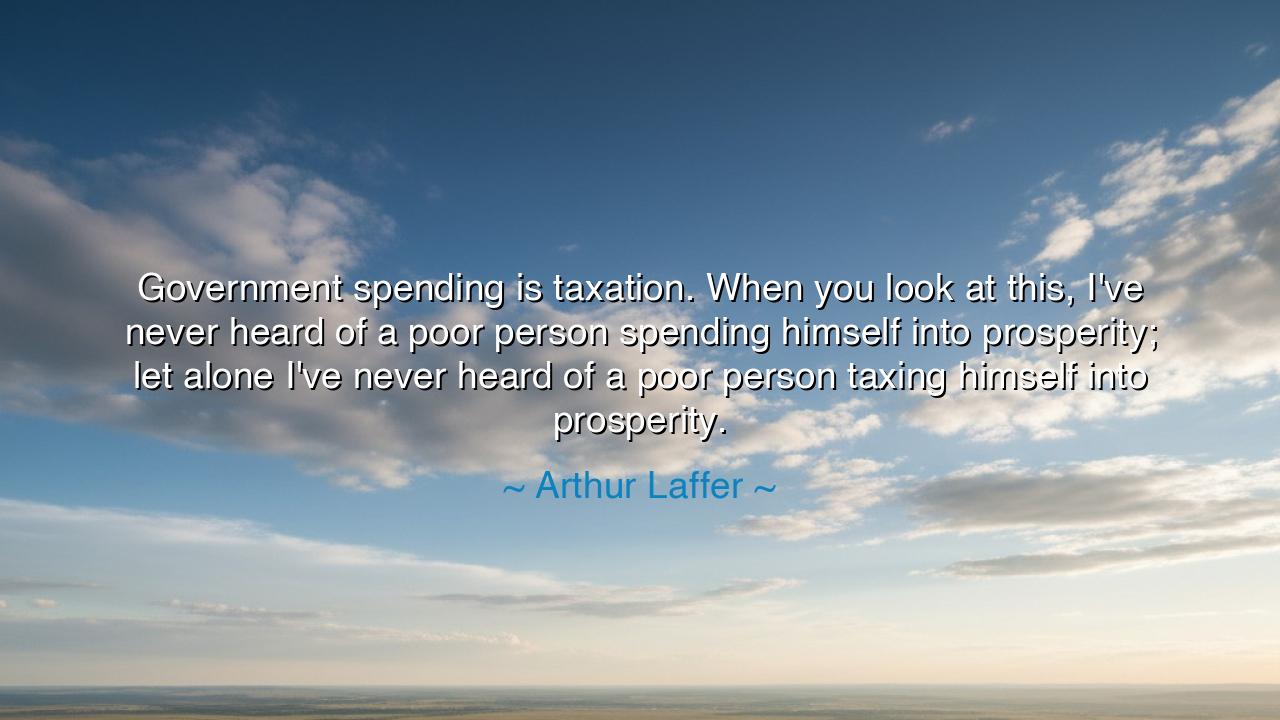
Government spending is taxation. When you look at this, I've
Government spending is taxation. When you look at this, I've never heard of a poor person spending himself into prosperity; let alone I've never heard of a poor person taxing himself into prosperity.






When Arthur Laffer declared, “Government spending is taxation. When you look at this, I've never heard of a poor person spending himself into prosperity; let alone I've never heard of a poor person taxing himself into prosperity,” he spoke as one who had gazed deeply into the cycles of wealth and power, and seen how easily nations deceive themselves with the illusion of endless abundance. His words are not merely about economics — they are about human nature, about the peril of believing that prosperity can be summoned by decree, or that a nation can grow richer by consuming its own future.
This quote arises from the heart of Laffer’s economic philosophy, most famously embodied in the Laffer Curve, which argues that there exists a balance between taxation and growth — a point where government can sustain itself without crushing the creative force of its citizens. Laffer warned that when a state spends beyond its means, it is not conjuring wealth, but merely borrowing from tomorrow. Every dollar the government spends must come from someone’s labor, someone’s sweat, someone’s sacrifice. Thus, “government spending is taxation,” whether the tax is collected today or hidden beneath the weight of inflation and debt.
The spirit of his warning echoes the wisdom of the ancients: that no empire has ever taxed itself into greatness. Rome learned this truth in its decline. As emperors expanded the bureaucracy, financed wars, and promised “bread and circuses” to appease the people, they drained the treasury and debased the currency. Gold became bronze, and bronze became dust. Prosperity withered into dependency. The citizens who once built roads and aqueducts became beggars at the gates of the state. In this way, generosity without discipline became the undoing of civilization itself.
Laffer’s insight also calls to mind the tragedy of Weimar Germany after the First World War. In an attempt to pay its debts and pacify unrest, the government printed money to fund spending — and in doing so, destroyed the value of its currency. Savings evaporated overnight. Workers carried wages home in wheelbarrows, and bread cost millions of marks. What began as economic “stimulus” became a storm of despair. From that collapse rose tyranny — a grim reminder that when leaders trade prudence for illusion, freedom itself becomes the first casualty.
At its core, Laffer’s statement is not a rejection of compassion, but a defense of stewardship. True prosperity, he teaches, is not built by consuming, but by creating — not by redistribution, but by unleashing the productive spirit within each person. A poor man cannot spend himself into wealth because spending is the use of what already exists; only creation multiplies value. In the same way, a government cannot tax its way into abundance without first cultivating the soil from which wealth grows — innovation, enterprise, and human endeavor.
There is something profoundly moral in this truth. For when a government spends recklessly, it is not merely mismanaging numbers; it is eroding the dignity of those who work and produce. Excessive taxation punishes success and discourages effort, while endless spending breeds dependence and weakens the will of a people. Freedom and prosperity are inseparable, and both require restraint — the wisdom to know when enough is enough, when to give and when to save, when to build and when to rest.
The lesson of Arthur Laffer’s words is therefore clear: prosperity is not a gift bestowed by governments, but the fruit of human creativity, discipline, and moral courage. Each generation must guard this truth, lest it trade liberty for comfort, and inheritance for indulgence. To build a lasting future, citizens must demand fiscal responsibility from their leaders and from themselves. For no family, no nation, no civilization can thrive by spending what it does not earn — and no people can remain free when they forget that wealth is born not from taxation, but from the triumph of enterprise.
Let his words be carried like a warning through the ages: a reminder that real prosperity is not found in the halls of power, but in the hands of those who labor, create, and dream. Governments may guide, protect, and provide justice — but when they begin to consume more than they nurture, they devour the very roots of their strength. Thus, to the wise, Laffer’s teaching endures as both counsel and command: live within your means, honor the fruits of honest work, and let freedom, not control, be the architect of prosperity.






AAdministratorAdministrator
Welcome, honored guests. Please leave a comment, we will respond soon